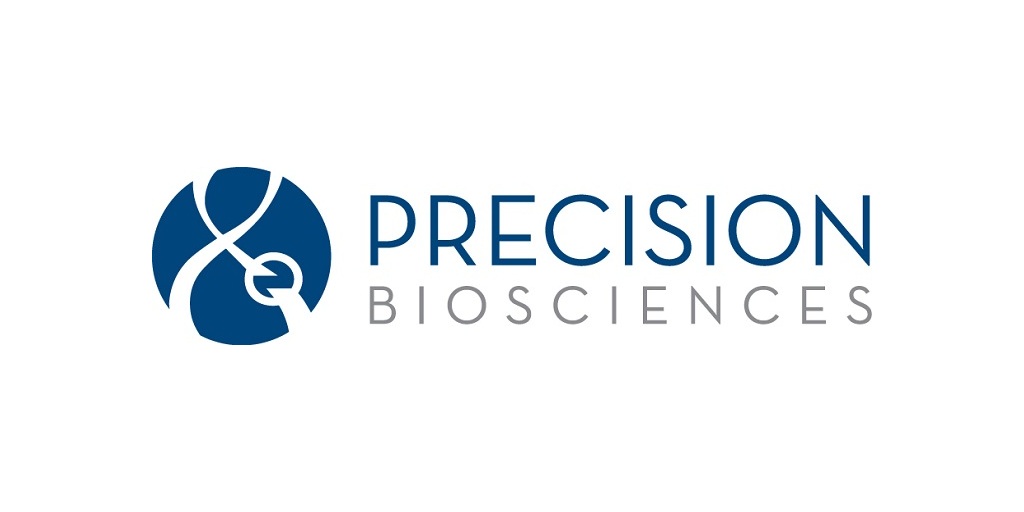- Stimulating gene editing by homology-directed repair (HDR) has the potential advantage of being able to achieve any type of edit, including gene insertion
- ARCUS approach potentially offers broader therapeutic than current gene editing modalities for diseases that require a gain in function
DURHAM, N.C.--(BUSINESS WIRE)--Precision BioSciences, Inc. (Nasdaq: DTIL), a clinical stage gene editing company utilizing its novel proprietary ARCUS® platform to develop in vivo gene editing therapies for sophisticated gene edits, today announced a poster presentation at the European Society of Gene & Cell Therapy (ESGCT) 31st Annual Congress being held October 22-25, 2024, in Rome, Italy. The poster highlighted preclinical data demonstrating the ability of ARCUS to achieve high-efficiency gene insertion, gene replacement and base correction via homology-directed repair (HDR).
“Gene editing enzymes that support efficient HDR are relatively rare. However, we demonstrate here that ARCUS is capable of utilizing HDR with high efficiency to achieve a range of gene editing outcomes, including specific base changes, insertions, and the replacement of large segments of DNA within the genome,” said Jeff Smith, PhD, Co-Founder and Chief Research Officer of Precision BioSciences. “These data continue to validate the ARCUS platform as an ideal modality for treating diseases that require gene insertion or repair to restore function whereas other gene editing modalities are largely focused on knocking-out function. In addition to the preclinical data presented today, we look forward to seeing supportive clinical validation of HDR-based ARCUS gene insertion through our partner iECURE, who is advancing their ECUR-506 clinical stage program utilizing an ARCUS nuclease for treating OTC deficiency,” added Jeff Smith.
Title: High-efficiency homology-directed insertion into the genome using ARCUS nucleases
Poster Number: #PO678
Presenter: Adam Mischler, PhD, Senior Scientist, Precision BioSciences Gene Discovery
Date and Time: Thursday, October 24, 2024, 6:00-7:30pm CEST
In preclinical work presented today, we show that targeted gene insertion can be achieved using ARCUS in greater than 85% of T cells and 39% of non-dividing primary human hepatocytes. These high rates of gene insertion were accomplished primarily through HDR as evidenced by the dependency on homology arms in the repair template and on the unique ARCUS 3’ 4 base pair overhang cut that resembles a processed end for stimulating HDR. Using HDR, ARCUS successfully demonstrates the ability to support a wide range of DNA editing approaches using a template to define the specific edit. Unlike base editors’ limitation to two possible base changes, ARCUS was able to produce all twelve possible base changes, in addition to producing very specific base removal and insertions. Unlike prime editors, ARCUS was also able to generate whole gene insertions and even replace large segments within a gene to restore function. The characteristic enzymology of ARCUS nucleases drives high rates of HDR, which can potentially be leveraged to achieve a multitude of highly precise gene editing functions for therapeutic benefit.
About Precision BioSciences, Inc.
Precision BioSciences, Inc. is an advanced gene editing company dedicated to improving life (DTIL) with its novel and proprietary ARCUS genome editing platform that differs from other technologies in the way it cuts, its smaller size, and its simpler structure. Key capabilities and differentiating characteristics may enable ARCUS nucleases to drive more intended, defined therapeutic outcomes. Using ARCUS, the Company’s pipeline is comprised of in vivo gene editing candidates designed to deliver lasting cures for the broadest range of genetic and infectious diseases where no adequate treatments exist. For more information about Precision BioSciences, please visit www.precisionbiosciences.com.
The ARCUS platform is being used to develop in vivo gene editing therapies for sophisticated gene edits, including gene insertion (inserting DNA into a gene to cause expression/add function), elimination (removing a genome, e.g., viral DNA or mutant mitochondrial DNA), and excision (removing a large portion of a defective gene by delivering two ARCUS nucleases in a single AAV).
Forward-Looking Statements
This press release contains forward-looking statements within the meaning of the Private Securities Litigation Reform Act of 1995. All statements contained in this press release that do not relate to matters of historical fact should be considered forward-looking statements, including, without limitation, statements regarding the clinical development and expected safety, efficacy and benefit of our product candidates and gene editing approaches including editing efficiency, key capabilities and differentiating characteristics, the ability of ARCUS to achieve any type of edit including high-efficiency gene insertion, gene replacement, and base correction, the ability of ARCUS to stimulate gene editing by homology directed repair, the potentially broader therapeutic potential of ARCUS for diseases that require a gain in function than current gene editing modalities and the suitability of ARCUS nucleases for gene elimination, insertion and excision and differentiation from other gene editing approaches due to its small size, simplicity and distinctive cut. In some cases, you can identify forward-looking statements by terms such as “aim,” “anticipate,” “approach,” “believe,” “contemplate,” “could,” “designed,” “estimate,” “expect,” “goal,” “intend,” “look,” “may,” “mission,” “plan,” “possible,” “potential,” “predict,” “project,” “pursue,” “should,” “strive,” “target,” “will,” “would,” or the negative thereof and similar words and expressions.
Forward-looking statements are based on management’s current expectations, beliefs and assumptions and on information currently available to us. These statements are neither promises nor guarantees, and involve a number of known and unknown risks, uncertainties and assumptions, and actual results may differ materially from those expressed or implied in the forward-looking statements due to various important factors, including, but not limited to, our ability to become profitable; our ability to procure sufficient funding to advance our programs; risks associated with our capital requirements, anticipated cash runway, requirements under our current debt instruments and effects of restrictions thereunder, including our ability to raise additional capital due to market conditions and/or our market capitalization; our operating expenses and our ability to predict what those expenses will be; our limited operating history; the progression and success of our programs and product candidates in which we expend our resources; our limited ability or inability to assess the safety and efficacy of our product candidates; the risk that other genome-editing technologies may provide significant advantages over our ARCUS technology; our dependence on our ARCUS technology; the initiation, cost, timing, progress, achievement of milestones and results of research and development activities and preclinical and clinical studies, including clinical trial and investigational new drug applications; public perception about genome editing technology and its applications; competition in the genome editing, biopharmaceutical, and biotechnology fields; our or our collaborators’ or other licensees’ ability to identify, develop and commercialize product candidates; pending and potential product liability lawsuits and penalties against us or our collaborators or other licensees related to our technology and our product candidates; the U.S. and foreign regulatory landscape applicable to our and our collaborators’ or other licensees’ development of product candidates; our or our collaborators’ or other licensees’ ability to advance product candidates into, and successfully design, implement and complete, clinical trials; potential manufacturing problems associated with the development or commercialization of any of our product candidates; delays or difficulties in our and our collaborators’ and other licensees’ ability to enroll patients; changes in interim “top-line” and initial data that we announce or publish; if our product candidates do not work as intended or cause undesirable side effects; risks associated with applicable healthcare, data protection, privacy and security regulations and our compliance therewith; our or our licensees’ ability to obtain orphan drug designation or fast track designation for our product candidates or to realize the expected benefits of these designations; our or our collaborators’ or other licensees’ ability to obtain and maintain regulatory approval of our product candidates, and any related restrictions, limitations and/or warnings in the label of an approved product candidate; the rate and degree of market acceptance of any of our product candidates; our ability to effectively manage the growth of our operations; our ability to attract, retain, and motivate executives and personnel; effects of system failures and security breaches; insurance expenses and exposure to uninsured liabilities; effects of tax rules; effects of any pandemic, epidemic, or outbreak of an infectious disease; the success of our existing collaboration and other license agreements, and our ability to enter into new collaboration arrangements; our current and future relationships with and reliance on third parties including suppliers and manufacturers; our ability to obtain and maintain intellectual property protection for our technology and any of our product candidates; potential litigation relating to infringement or misappropriation of intellectual property rights; effects of natural and manmade disasters, public health emergencies and other natural catastrophic events; effects of sustained inflation, supply chain disruptions and major central bank policy actions; market and economic conditions; risks related to ownership of our common stock, including fluctuations in our stock price; our ability to meet the requirements of and maintain listing of our common stock on Nasdaq or other public stock exchanges; and other important factors discussed under the caption “Risk Factors” in our Quarterly Report on Form 10-Q for the quarterly period ended June 30, 2024, as any such factors may be updated from time to time in our other filings with the SEC, which are accessible on the SEC’s website at www.sec.gov and the Investors page of our website under SEC Filings at investor.precisionbiosciences.com. All forward-looking statements speak only as of the date of this press release and, except as required by applicable law, we have no obligation to update or revise any forward-looking statements contained herein, whether as a result of any new information, future events, changed circumstances or otherwise.
Contacts
Investor and Media Contact:
Naresh Tanna
Vice President of Investor Relations
naresh.tanna@precisionbiosciences.com






